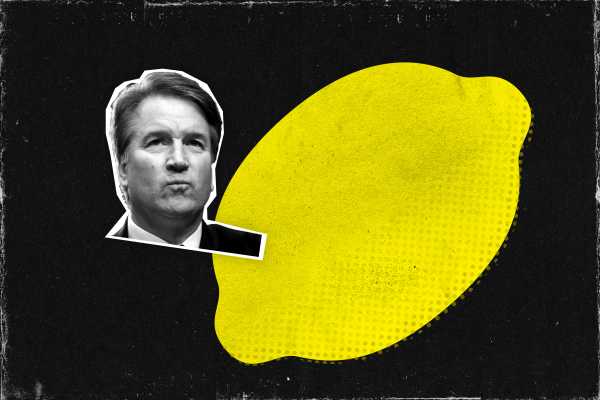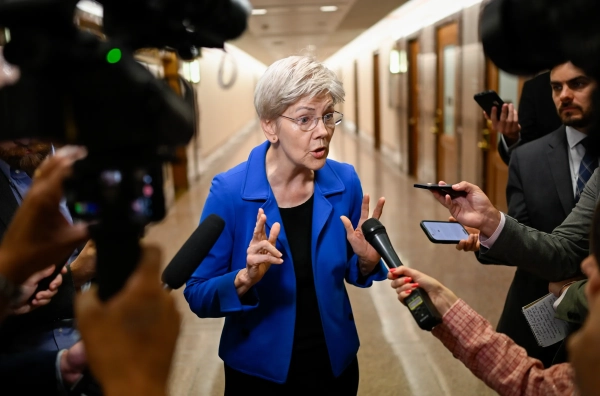
Brett Kavanaugh can still be confirmed to the Supreme Court — if Senate Republicans stick with him.
But their support is reportedly softening. Several senators, even members of leadership, told Politico on Monday that they’re waiting until Thursday’s Senate Judiciary Committee hearing, at which Kavanaugh and Christine Blasey Ford are expected to testify about Ford’s allegations that Kavanaugh sexually assaulted her as a high school student, before making up their minds. (Kavanaugh denies these allegations.)
And what if enough of them decide that it’s not worth it to confirm Kavanaugh after all that? What if they decide it’s safer to vote him down, or pressure Trump to withdraw the nomination, and nominate another conservative judge for Anthony Kennedy’s vacated Court seat instead?
Kavanaugh wasn’t their first choice to begin with. Senate Majority Leader Mitch McConnell (R-KY) reportedly told Trump in July, while the president was deliberating, that he’d have a harder time confirming Kavanaugh than other judges on Trump’s short list (Raymond Kethledge and Thomas Hardiman) because of his paper trail as a staffer on the Clinton impeachment investigation and in the Bush White House.
In retrospect, given the allegations against Kavanaugh, it looks like McConnell was right all along for a very different reason. According to the Washington Post’s Robert Costa, factions supporting various alternatives to Kavanaugh were already maneuvering last week to press for their picks.
Maybe Republicans should go with Kethledge or Hardiman after all; maybe former short-lister Amy Coney Barrett would be a good pick to replace a man accused of misogyny; maybe Amul Thapar, reportedly McConnell’s early favorite, might be more appealing to Trump than he was last time.
We don’t know anything about whether any of the following judges have ever been accused of sexual assault or misconduct. But they’re not Brett Kavanaugh, and right now, that’s what matters.
The eternal backup: Thomas Hardiman

Current position: Federal appellate judge (Third Circuit Court of Appeals)
The case for him: When Donald Trump picked Neil Gorsuch in 2017 to fill the seat vacated by Antonin Scalia, Hardiman was reportedly his second choice — in a decision that Trump dragged out until the eleventh hour for extra television drama. When Anthony Kennedy retired in June, Hardiman again made his way to the short list.
The fact that Hardiman has now twice been the metaphorical bridesmaid might mean that Trump isn’t exactly enthusiastic about him — although the president’s sister, fellow Third Circuit Judge Maryanne Trump Barry, has reportedly championed Hardiman. But he’s made it so far twice, meaning he’s already passed whatever (possibly insufficient) vetting process the Trump White House has.
Hardiman doesn’t have the full-throated conservative support that other shortlisters do; when his name was floated the first time, some conservatives argued based on extremely paltry evidence that he was a stealth liberal. While Hardiman appears to have his partisans in Congress, per Costa, he’s ideologically more Trump’s kind of conservative than Paul Ryan’s.
On the Third Circuit, Hardiman has consistently sided with law enforcement against defendants and inmates. He ruled that a policy of strip-searching jail inmates didn’t violate the Fourth Amendment’s protections against unreasonable search (an opinion the Supreme Court upheld). He’s also written, in dissent, that the First Amendment does not give citizens the right to tape police — something with which every state in the union currently disagrees.
Hardiman’s pre-judicial career is full of the kinds of things liberals and Democrats don’t like: He donated to Republican candidates before being appointed to the bench (something that is neither illegal nor, to most legal experts, a big deal), and he represented plenty of political clients and political cases while he was in private practice. Most of this is insignificant: Just like it’s a defense lawyer’s job to defend murderers, it’s a civil lawyer’s job to defend companies accused of discrimination.
Compared to a bloody confirmation battle to defend a man accused of at least one sexual assault, Republicans might find it downright appealing to defend a nominee for things he did on the job.
The damage-control pick: Amy Coney Barrett

Current position: Federal appellate judge (Seventh Circuit Court of Appeals)
The case for her: There was always some appeal to nominating a conservative woman to fill Kennedy’s seat: overturning Roe v. Wade might be less galvanizing to progressives if a woman casts the decisive fifth vote.
If Republicans withdraw Kavanaugh, that argument gets a whole lot stronger. Not only would it be harder to accuse a woman of sexism in her jurisprudence, but it would be much harder to argue her jurisprudence stemmed from a disrespect for women in her personal life.
Enter Amy Coney Barrett — who was initially on Trump’s shortlist for Kennedy’s seat, and who a lot of outside observers think is the obvious choice to replace Kavanaugh.
Barrett, only 46, is relatively new to the bench; her first appointment came from Trump in 2017. She only got her commission last November. (Before joining the federal bench, Barrett was a clerk to conservative appellate Judge Laurence Silberman as well as Antonin Scalia, and a longtime professor at Notre Dame.) But Clarence Thomas was barely on the circuit court for a year when he was elevated to the Supreme Court, and there’s no reason Barrett couldn’t follow in his footsteps.
Barrett was likely hampered by her educational pedigree when Trump passed her over for Kavanaugh; Barrett’s law degree comes from Notre Dame Law School, while Trump said at the time he wanted a Supreme Court nominee with degrees from Harvard or Yale. But Kavanaugh’s prep school and Yale background now looks more like a liability than an asset; the saga may make Trump a little less star-struck about the Ivy League. (Barrett also reportedly performed poorly in her one-on-one interview with Trump over the summer, which might be harder to get over.)
Barrett wouldn’t necessarily be an easy pick to get through the Senate. Sens. Susan Collins (R-ME) and Lisa Murkowski (R-AK) appear to at least want to be able to claim that they’re electing a justice who will preserve Roe v. Wade — and it’s not clear Barrett will clear that bar.
Liberal groups have identified Barrett’s writing on questions of Catholic faith and constitutional interpretation as concerning, noting a piece she co-authored that rejected Justice William Brennan’s argument that Catholic judges should always hold the Constitution as more important than their religious faith.
In her confirmation hearing for the Seventh Circuit, Barrett asserted that these were her co-author’s views, not her own. But the hearings earned headlines due to a controversial line of questioning from Democratic Sens. Dick Durbin (IL) and Dianne Feinstein (CA), who asked her repeatedly about her Catholic faith. Durbin asked, “Do you consider yourself an orthodox Catholic?” while Feinstein commented, “When you read your speeches, the conclusion one draws is that the dogma lives loudly within you.”
That sort of questioning — which conservatives characterized as Feinstein trying to impose an unconstitutional “religious test” for office on Barrett — could make for some feisty Supreme Court confirmation hearings. Some (like Margaret Hartmann of New York magazine) have speculated that Trump might relish the idea of partisan conflict during a hearing to fire up the base.
Barrett also argued that the birth control benefit in the Affordable Care Act impinges on religious liberty, argues that cases like Roe v. Wade might not need to stand as precedents if future courts judge them to be wrongly decided, and has explicitly asserted that the “original public meaning” of the Constitution must be upheld, even though that “adherence to originalism arguably requires, for example, the dismantling of the administrative state, the invalidation of paper money, and the reversal of Brown v. Board of Education.”
Barrett was ultimately confirmed with only three Democrats (Joe Manchin, Joe Donnelly, and Tim Kaine) voting in favor. But an elevation to the Supreme Court would force a much larger dispute about what, exactly, she believes the original meaning of the Constitution requires.
Some court-watchers were concerned that Barrett has been too explicit on abortion to be confirmed as Kennedy’s replacement. But the battle to replace Kennedy isn’t about abortion at present — it’s about sexual misconduct. So there’s an argument that if you want to confirm someone who’d otherwise be controversial on her own, this is the time.
The safe choice: Raymond Kethledge

Current position: Federal appellate judge (Sixth Circuit Court of Appeals)
The case for him: Kethledge has Kavanaugh’s assets — solidly conservative jurisprudence; longtime Republican bona fides; an appropriate level of discretion in public comments about hot-button issues — without Kavanaugh’s paper trail.
Admittedly, he, like Barrett, doesn’t have Kavanaugh’s elite pedigree. And he’s not among the judges Costa mentioned in the behind-the-scenes jockeying last week. But he also doesn’t raise the ideological concerns of a Hardiman (to conservatives’ left) or Barrett (to moderates’ right).
The other asset Kethledge has going for him is that he’s extremely clever in his jurisprudence but isn’t out to show off or pick on the other side in oral argument — traits that might make him stand out as a mature alternative to Kavanaugh during confirmation hearings.
Just look at the difference in the two judges’ past work experience for Republicans. While Kavanaugh was one of the bulldogs of the Starr investigation, Kethledge was a Senate Judiciary Committee staffer under Michigan Republican Spencer Abraham. Abraham, while a founder of the Federalist Society, was also a pro-immigration Arab American who lost (to Debbie Stabenow) after being attacked as a terrorist sympathizer. And during his confirmation hearings before the committee in 2003, Kethledge emphasized his pro bono work with criminal defendants and low-income residents trying to keep their homes.
A 2013 Kethledge opinion, which has been cited even outside his home circuit, says “there are good reasons not to call an opponent’s argument ‘ridiculous’” — not the least of which, he elaborates, is that you might be wrong. That sort of humility might hold particular appeal for Republicans still smarting from Kavanaugh — and looking for a judge they can confirm as quickly and quietly as possible in his stead.
The (McConnell-backed?) resurgent: Amul Thapar

Current position: Federal appellate judge (Sixth Circuit)
The case for him: Thapar didn’t make it to the late rounds of Trump’s deliberations this summer. But apparently, again, according to Robert Costa, he was on Mitch McConnell’s shortlist all along:
When Trump first floated Thapar as a Supreme Court candidate in September 2016, he was just a district judge for the Eastern District of Kentucky (appointed by George W. Bush) — and district court judges are almost never elevated directly to the Supreme Court. (The last person to make that jump was Edward Terry Sanford in 1923.) But Trump nominated Thapar to the Sixth Circuit soon after his inauguration, and at this point Thapar’s been serving since May 2017 — which might be long enough for a promotion.
Brian Fitzpatrick of Vanderbilt Law, who researches federal courts, told Bloomberg BNA that Thapar was ”very Scalia-like and Thomas-like” in his jurisprudence — and accordingly, when he was in the mix this summer, progressive group Demand Justice mobilized to stop his prospective nomination.
They highlight a 2016 decision in which he ruled that a Kentucky state prohibition on political contributions by judges violated the First Amendment; his judgment was later overturned by the Sixth Circuit, which argued the restriction furthered a “compelling interest in preventing the appearance that judicial candidates are no different from other elected officials when it comes to quid pro quo politics.”
The left-wing Alliance for Justice highlighted five other decisions that — again, as of this summer — were sure to come up should Thapar be nominated. Those cases included one where he ruled that a male employee alleging a male co-worker sexually harassed him had to provide “credible evidence that the harasser was homosexual,” and another where he imposed harsh sentences on antiwar activists, including a nun, for an anti-nuclear protest that he alleged threatened national security. (Their convictions were later overturned.)
But again, having fights over a judge’s actual jurisprudence might be a fight that Republicans are happier to have. And if McConnell gets to tell Trump “I told you so” about Kavanaugh, it might be too appealing for the Senate majority leader to push for a replacement with some Kentucky roots.
Sourse: vox.com






